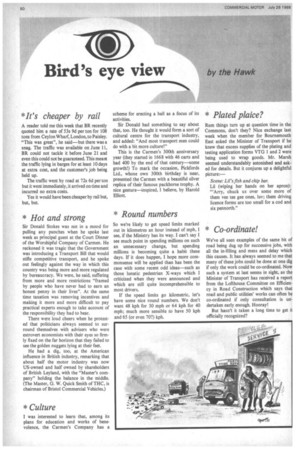Bird's eye view
Page 52

If you've noticed an error in this article please click here to report it so we can fix it.
*It's cheaper by rail
A reader told me this week that BR recently quoted him a rate of 53s 9d per ton for 108 tons from Ceylon Wharf, London, to Paisley. "This was great", he said—but there was a snag. The traffic was available on June 11, BR could not tackle it before June 21 and even this could not be guaranteed. This meant the traffic lying in barges for at least 10 days at extra cost, and the customer's job being held up.
The traffic went by road at 72s 6d per ton but it went immediately, it arrived on time and incurred no extra costs.
Yes it would have been cheaper by rail but, but, but.
* Hot and strong
Sir Donald Stokes was not in a mood for pulling any punches when he spoke last week as principal guest at the Court Dinner of the Worshipful Company of Carmen. He reckoned it was tragic that the Government was introducing a Transport Bill that would stifle competitive transport, and he spoke out feelingly against the way in which this country was being more and more regulated by bureaucracy. We were, he said, suffering from more and more restrictions "framed by people who have never had to earn an honest penny in their lives". At the same time taxation was removing incentives and making it more and more difficult to pay practical experts enough to take account of the responsibility they had to bear.
There were loud cheers when he protested that politicians always seemed to surround themselves with advisers who were extrovert economists with their eyes so firmly fixed on the far horizon that they failed to see the golden nuggets lying at their feet.
He had a dig, too, at the American influence in British industry, remarking that about half the motor industry was now US-owned and half owned by shareholders of British Leyland, with the "Master's company" holding the balance in the middle. (The Master, G. W. Quick Smith of THC, is chairman of Bristol Commercial Vehicles.)
* Culture
I was interested to learn that, among its plans for education and works of benevolence, the Carmen's Company has a scheme for erecting a hall as a focus of its activities.
Sir Donald had something to say about that, too. He thought it would form a sort of cultural centre for the transport industry, and added: "And most transport men could do with a bit more culture!"
This is the Carmen's 300th anniversary year (they started in 1668 with 46 carts and had 400 by the end of that century—some growth!) To mark the occasion, Pickfords Ltd., whose own 300th birthday is near, presented the Carmen with a beautiful silver replica of their famous packhorse trophy. A nice gesture—inspired, I believe, by Harold Elliott.
* Round numbers
So we're likely to get speed limits marked out in kilometres an hour instead of mph, I see, if the Ministry has its way. I can't say I see much point in spending millions on such an unnecessary change, but spending millions is becoming quite a habit these days. If it does happen, I hope more commonsense will be applied than has been the case with some recent odd ideas—such as those lunatic pedestrian X-ways which I criticized when they were announced and which are still quite incomprehensible to most drivers.
If the speed limits go kilometric, let's have some nice round numbers. We don't want 48 kph for 30 mph or 64 kph for 40 mph; much more sensible to have 50 kph and 65 (or even 70?) kph.
* Plated plaice?
Rum things turn up at question time in the Commons, don't they? Nice exchange last week when the member for Bournemouth East asked the Minister of Transport if he knew that excess supplies of the plating and testing application forms VTG I and 2 were being used to wrap goods. Mr. Marsh seemed understandably astonished and asked for details. But it conjures up a delightful picture:— Scene: LIN fish and chip bar.
Lil (wiping her hands on her apron): "'Arry, chuck us over some more of them vee tee gee ones, luv; them driving licence forms are too small for a cod and six pennorth."
* Co-ordinate!
We've all seen examples of the same bit of road being dug up for successive jobs, with all the in-filling and mess and delay which this causes. It has always seemed to me that many of these jobs could be done at one dig if only the work could be co-ordinated. Now such a system at last seems in sight, as the Minister of Transport has received a report from the Lofthouse Committee on Efficiency in Road Construction which says that road and public utilities' works can often be co-ordinated if only consultation is undertaken early enough. Hooray!
But hasn't it taken a long time to get it officially recognized?












































































































